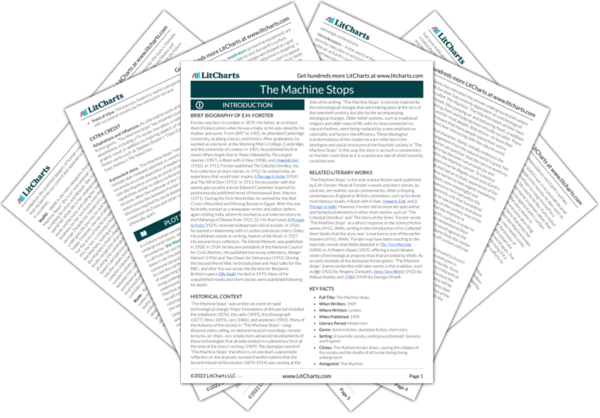Homelessness Quotes in The Machine Stops
“I did not get an Egression-permit.”
“Then how did you get out?”
“I found out a way of my own.”
The phrase conveyed no meaning to her, and he had to repeat it.
“A way of your own?” she whispered. “But that would be wrong.”
“Why?”
The question shocked her beyond measure.
“You are beginning to worship the Machine,” he said coldly. “You think it irreligious of me to have found out a way of my own. It was just what the Committee thought, when they threatened me with Homelessness.”
At this she grew angry. “I worship nothing!” she cried. “I am most advanced. I don’t think you irreligious, for there is no such thing as religion left. All the fear and the superstition that existed once have been destroyed by the machine. I only meant that to find out a way of your own was—Besides, there is no new way out.”
“So it is always supposed.”
“Except through the vomitories, for which one must have an Egression-permit, it is impossible to get out. The Book says so.”
“Well, the Book’s wrong, for I have been out on my feet.”

Unlock explanations and citation info for this and every other The Machine Stops quote.
Plus so much more...
Get LitCharts A+Tears gathered in his mother’s eyes. She knew that he was fated. If he did not die today he would die tomorrow. There was not room for such a person in the world. And with her pity disgust mingled. She was ashamed at having borne such a son, she who had always been so respectable and so full of ideas. Was he really the little boy to whom she had taught the use of his stops and buttons, and to whom she had given his first lessons in the Book? The very hair that disfigured his lip showed that he was reverting to some savage type. On atavism the Machine can have no mercy.
“Is there any hope, Kuno?”
“None for us.”
“Where are you?”
She crawled towards him over the bodies of the dead. His blood spurted over her hands.
“Quicker,” he gasped, “I am dying—but we touch, we talk, not through the Machine.”
He kissed her.
“We have come back to our own. We die, but we have recaptured life, as it was in Wessex, when Aelfrid overthrew the Danes. We know what they know outside, they who dwelt in the cloud that is the colour of a pearl.”
“But, Kuno, is it true? Are there still men on the surface of the earth? Is this—this tunnel, this poisoned darkness—really not the end?”
He replied:
“I have seen them, spoken to them, loved them. They are hiding in the mist and the ferns until our civilization stops. To-day they are the Homeless—to-morrow—”
“Oh, to-morrow—some fool will start the Machine again, to-morrow.”
“Never,” said Kuno, “never. Humanity has learnt its lesson.”












